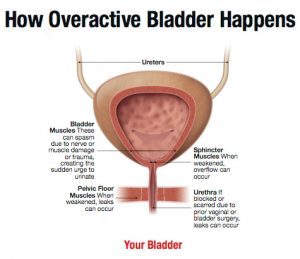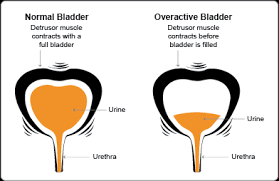The main causes of Overactive bladder are as follows;
1. Bladder Fullness
Okay, so this one doesn’t sound too insightful – but it’s true. Many of us have a terrible habit of holding our pee for way too long. (Which is not a good idea, by the way!) Habitually clenching your bladder muscles can lead to the worsening of OAB-like symptoms.

2-Diuretics
Diuretics are often prescribed to treat high blood pressure and congestive heart failure. They are also used to relieve fluid buildup in the body as a result of congestive heart failure. While useful, diuretics soak up extra water and salt within the body to expel as urine. This can cause someone to need to make more frequent trips to the restroom.
3. Cognitive Decline
It’s well understood that our brain loses a bit of its sharpness as we get older. As a result, it may become a bit harder for the urinary system to interpret signals from the nervous system, which may cause an overactive bladder. Cognitive decline is also a symptom of conditions like multiple sclerosis (MS) and stroke.
4. Menopause
As many women reading this may attest, menopause has a way of screwing with hormones, including estrogen. Estrogen can suddenly drop during menopause, which can weaken the bladder muscles. This weakness may then lead to urine leakage, a condition known as incontinence.
5. Diabetes or Pre-diabetes
Incessant urination is one of the symptoms of both type 1 and type 2 diabetes. The reason for this is that the kidneys of diabetics and pre-diabetics work harder to expel blood sugar. This effectively sends the kidneys into overdrive – and us to the bathroom.






